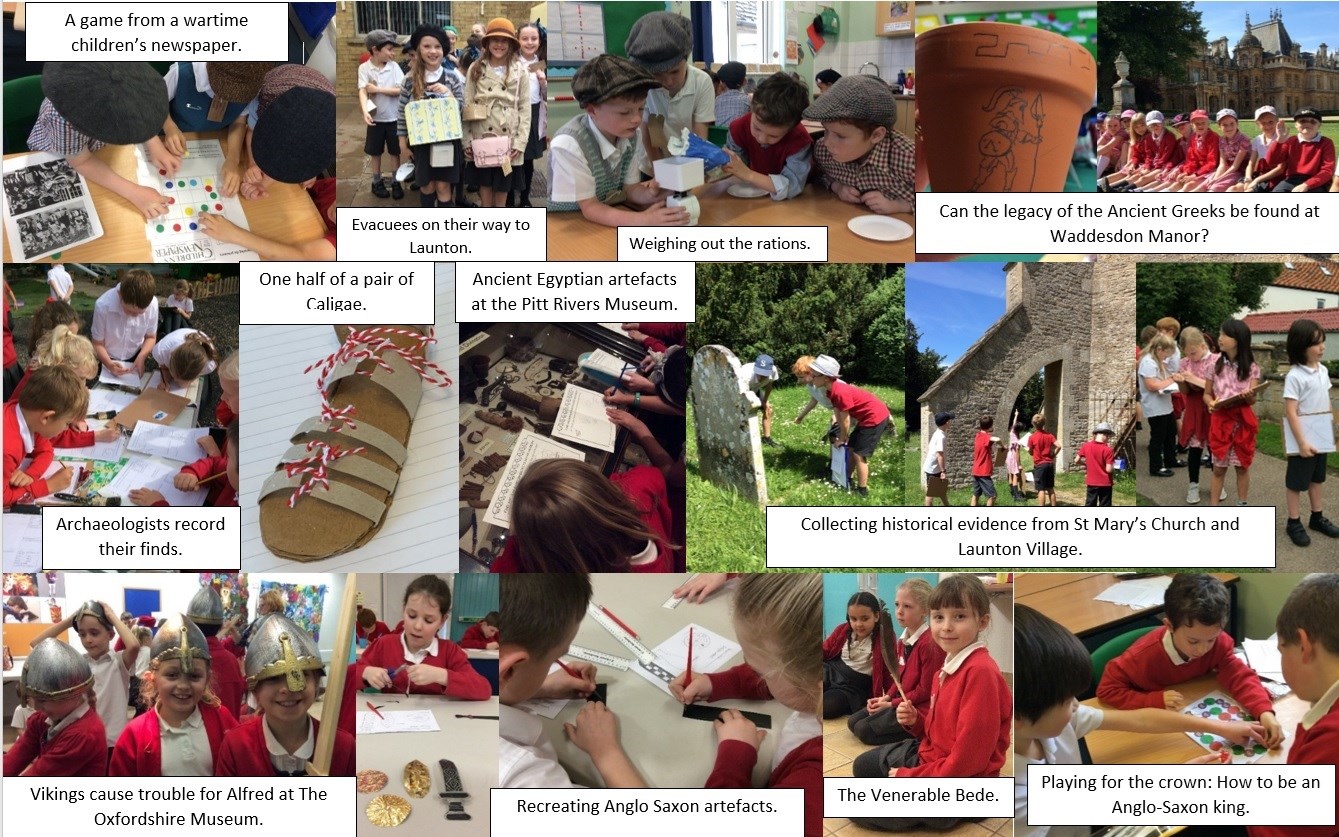History
Intent
A high-quality history education will help pupils gain a coherent knowledge and understanding of Britain’s past and that of the wider world. It should inspire pupils’ curiosity to know more about the past. Teaching should equip pupils to ask perceptive questions, think critically, weigh evidence, sift arguments, and develop perspective and judgement. History helps pupils to understand the complexity of people’s lives, the process of change, the diversity of societies and relationships between different groups, as well as their own identity and the challenges of their time.
Our aim at Launton CE Primary School is to encourage pupils to develop an appreciation and understanding of the past, evaluating a range of primary and secondary sources. Our historians will also be able to explain clearly how these sources give us an insight about how people around the world used to live and how these interpretations may differ. Pupils will be taught to make links between these areas of learning, with the aim of developing engaged, motivated and curious learners that can reflect on the past and make meaningful links to the present day.
Our History curriculum has been designed to cover all of the skills, knowledge and understanding as set out in the National Curriculum. The National Curriculum states that ‘a high-quality history education will help pupils gain a coherent knowledge and understanding of Britain’s past and that of the wider world. It should inspire pupils’ curiosity to know more about the past.’ To ensure that pupils develop a secure knowledge that they can build on, our History curriculum is organised into a progression model that outlines the skills, knowledge and vocabulary to be taught in a sequentially coherent way.
Content will be carefully organised by each year group through a long term plan. Content knowledge, vocabulary and skills will then be planned for at a greater level of detail in the medium term plan. History is delivered through subject specific teaching organised into blocks under a theme. Meaningful links with other subjects are made to strengthen connections and understanding for pupils.
Implementation
All learning will start by revisiting prior knowledge. This will be scaffolded to support children to recall previous learning and make connections. Staff will model explicitly the subject-specific vocabulary, knowledge and skills relevant to the learning to allow them to integrate new knowledge into larger concepts.
Learning will be supported through the use of knowledge organisers that provide children with scaffolding that supports them to retain new facts and vocabulary in their long term memory. Knowledge organisers are used for pre-teaching, to support home learning and also as a part of daily review.
Consistent learning walls in every classroom provide constant scaffolding for children. Tier three subject specific vocabulary is displayed on the learning wall along with key facts and questions, and model exemplars of the work being taught.
Weekly curriculum quizzes are used to review learning and check that children know more and remember more. These are based on the Kagan research and require children to think deeply. Learning is reviewed also on a termly basis, after a period of forgetting, so that teachers can check whether information has been retained.
Impact
We strive to ensure that our pupils are confident and able to talk about what they have learnt
in history using subject specific vocabulary. Pupil voice also demonstrates that pupils enjoy history and are able to recall their learning over time. Pupils work demonstrates that history is taught at an age appropriate standard across each year group with opportunities planned in for pupils working at greater depth. Work is of good quality and demonstrates pupils are acquiring knowledge, skills and vocabulary in an appropriate sequence.

Statutory Framework for Early Years (updated 2021)
Understanding the world involves guiding children to make sense of their physical world and their community. The frequency and range of children’s personal experiences increases their knowledge and sense of the world around them – from visiting parks, libraries and museums to meeting important members of society such as police officers, nurses and firefighters. In addition, listening to a broad selection of stories, non-fiction, rhymes and poems will foster their understanding of our culturally, socially, technologically and ecologically diverse world. As well as building important knowledge, this extends their familiarity with words that support understanding across domains. Enriching and widening children’s vocabulary will support later reading comprehension.
EYFS Outcomes
Children at the expected level of development will:
- Talk about the lives of the people around them and their roles in society;
- Know some similarities and differences between things in the past and now, drawing on their experiences and what has been read in class;
- Understand the past through settings, characters and events encountered in books read in class and storytelling.
KS1 Outcomes
Pupils should develop an awareness of the past, using common words and phrases relating to the passing of time. They should know where the people and events they study fit within a chronological framework and identify similarities and differences between ways of life in different periods. They should use a wide vocabulary of everyday historical terms. They should ask and answer questions, choosing and using parts of stories and other sources to show that they know and understand key features of events. They should understand some of the ways in which we find out about the past and identify different ways in which it is represented.
KS2 Outcomes
Pupils should continue to develop a chronologically secure knowledge and understanding of British, local and world history, establishing clear narratives within and across the periods they study. They should note connections, contrasts and trends over time and develop the appropriate use of historical terms. They should regularly address and sometimes devise historically valid questions about change, cause, similarity and difference, and significance. They should construct informed responses that involve thoughtful selection and organisation of relevant historical information. They should understand how our knowledge of the past is constructed from a range of sources.


